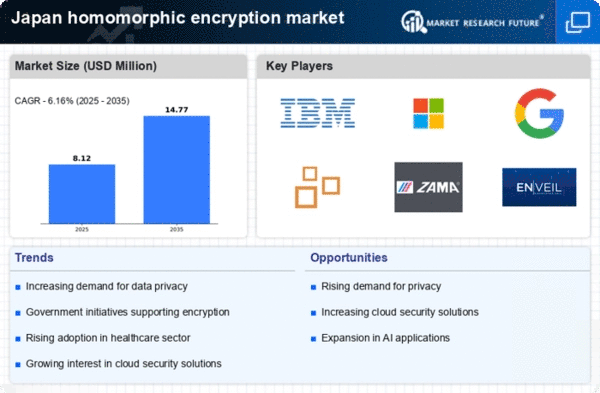Emergence of Smart Cities
Japan's commitment to developing smart cities is driving the need for secure data management solutions. As urban areas become increasingly interconnected, the volume of data generated from IoT devices and sensors is surging. The homomorphic encryption market is well-positioned to support this trend by providing encryption methods that allow for secure data analysis without compromising privacy. With the Japanese government investing heavily in smart city initiatives, the demand for secure data processing solutions is likely to rise. It is estimated that the smart city market in Japan could reach $100 billion by 2030, creating a fertile ground for the homomorphic encryption market to thrive as cities seek to protect citizen data while enhancing urban services.
Regulatory Landscape Evolution
The evolving regulatory landscape in Japan is compelling organizations to adopt stringent data protection measures. New regulations aimed at enhancing data privacy are emerging, prompting businesses to seek solutions that comply with these standards. The homomorphic encryption market is likely to gain traction. Organizations are looking for ways to ensure compliance while maintaining data utility. For instance, the Personal Information Protection Act (PIPA) mandates strict guidelines for handling personal data, which could drive the adoption of encryption technologies. As compliance becomes a critical factor for businesses, the homomorphic encryption market may see increased investment, potentially reaching $200 million by 2026 as companies prioritize regulatory adherence.
Rising Cloud Computing Adoption
The rapid adoption of cloud computing in Japan is influencing the demand for secure data processing solutions. As businesses migrate to cloud environments, concerns regarding data security and privacy are paramount. The homomorphic encryption market offers a unique solution by enabling computations on encrypted data stored in the cloud, thus addressing these concerns. With the cloud services market in Japan projected to grow to $50 billion by 2025, the need for secure encryption methods is likely to increase. This trend suggests that organizations will seek homomorphic encryption solutions to ensure that their data remains protected while leveraging the benefits of cloud computing.
Increased Cybersecurity Concerns
The rise in cyber threats has heightened the focus on data protection in Japan, driving the demand for advanced security solutions. Organizations are increasingly recognizing the need for robust encryption methods to safeguard sensitive information. The homomorphic encryption market is poised to benefit from this trend. It allows computations on encrypted data without exposing it. This capability is particularly appealing to sectors such as finance and healthcare, where data breaches can have severe consequences. As a result, investments in cybersecurity measures are expected to grow, with the market projected to reach approximately $300 million by 2027. This growth reflects a broader shift towards prioritizing data security, thereby enhancing the relevance of the homomorphic encryption market in Japan.
Growing Adoption of Artificial Intelligence
The integration of artificial intelligence (AI) into various sectors in Japan is creating a demand for secure data processing methods. As organizations leverage AI for data analysis, the need for privacy-preserving techniques becomes paramount. Homomorphic encryption market solutions enable AI algorithms to operate on encrypted data, ensuring that sensitive information remains confidential. This capability is particularly crucial in industries such as finance and healthcare, where data privacy is a legal requirement. The market for AI in Japan is expected to grow at a CAGR of 30% from 2025 to 2030, indicating a substantial opportunity for the homomorphic encryption market to align with AI advancements and address the associated security challenges.
















